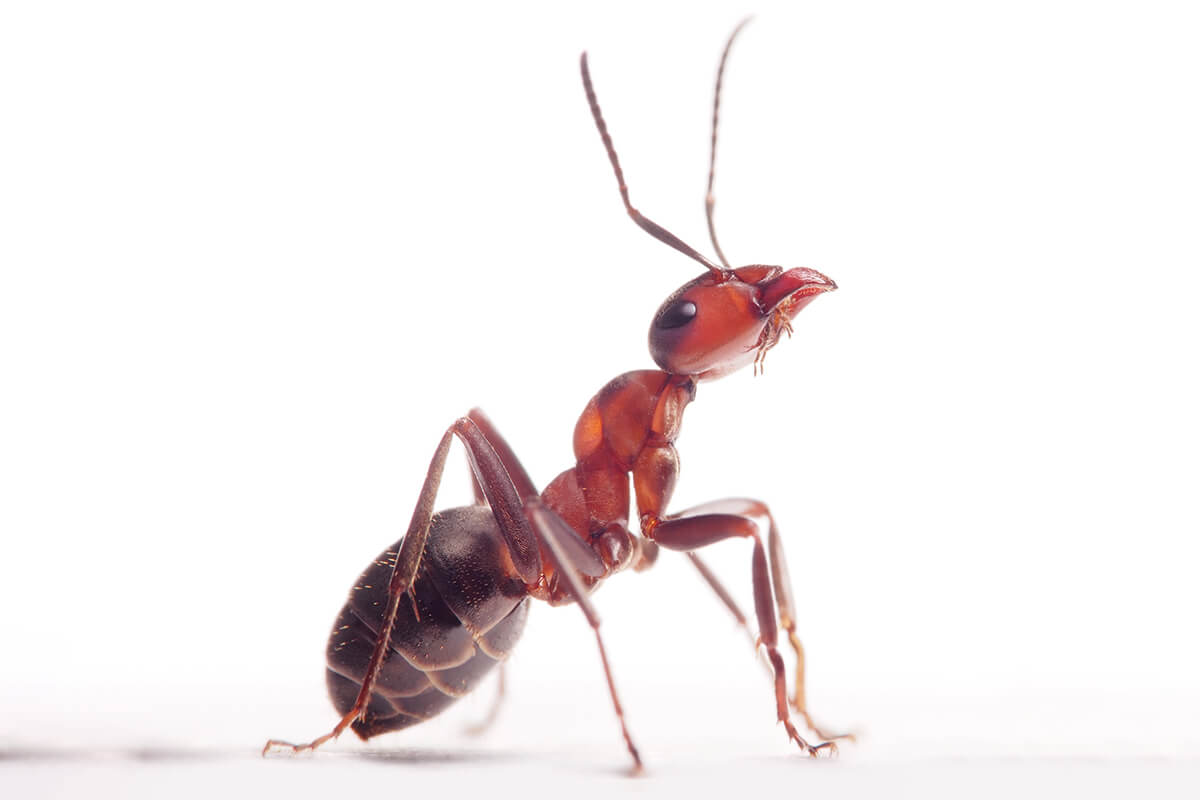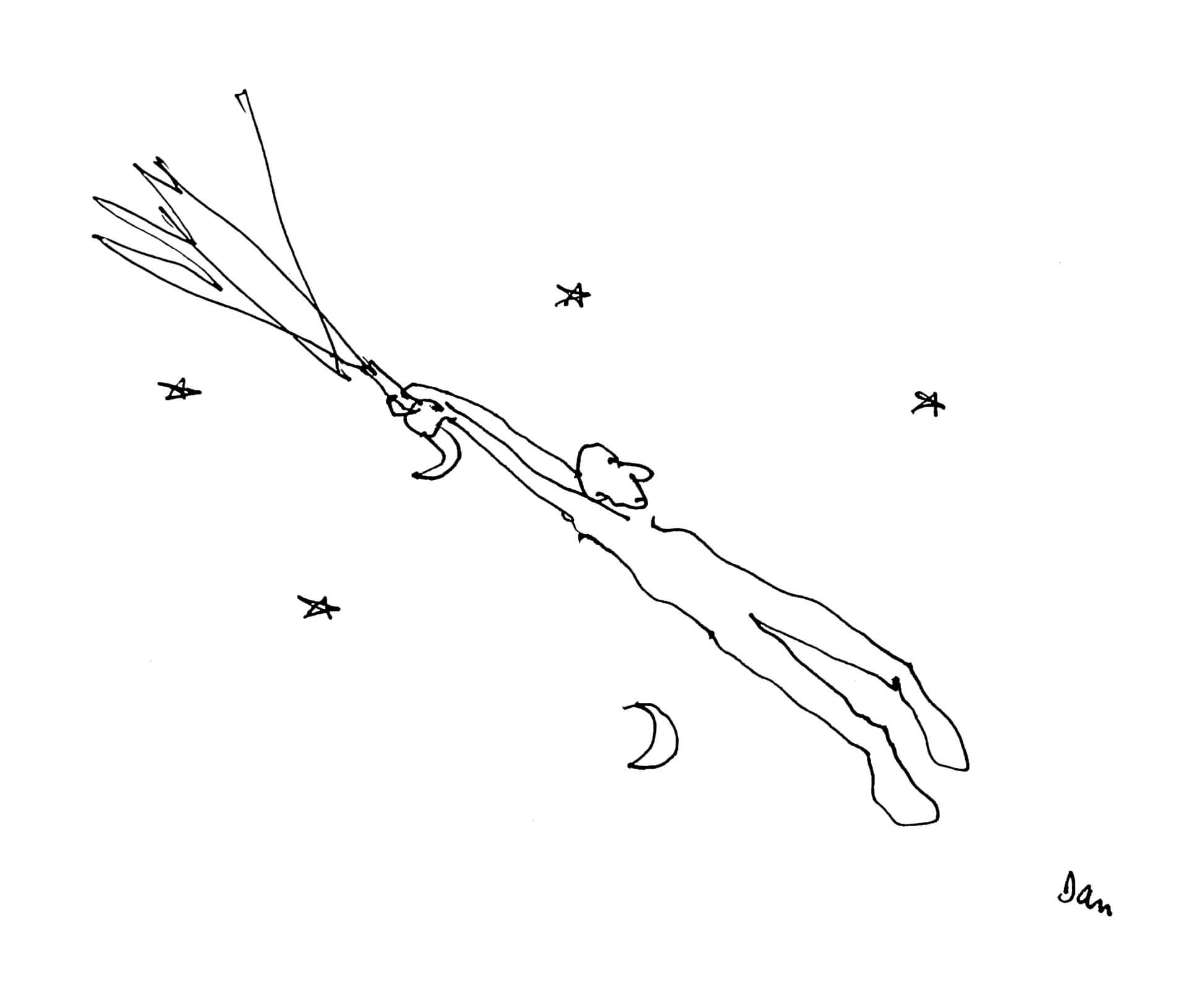The Ant in My Kitchen

Doing the dishes after lunch last Monday, I noticed a black ant walking across the kitchen floor heading toward a little rip in the screen door. I don’t like having ants in our house. And where there’s one there’s sometimes more very soon.
Where possible, I use a dustpan and brush to help an ant like this along. But if it tries to scurry away, I go to plan B, and I’m sure you know what that is. Anyway, then it’s over. And I go about my business.
As I got closer to this ant, however, I saw that it was transporting something. A crumb. It probably had come off a Nutter Butter cookie one of the kids was eating earlier. Now, it was a prize, almost as big as the ant itself, but being carefully carried aloft with its forelegs.
It saw me coming. And with that, it started running away, turning away from the screen and picking up the pace. So I stepped on it.
And then I imagined the repercussions of this. It had been sent out. Bring back food. Perhaps it was from the queen and it was one of the servants. Or maybe it had a family it was bringing the crumb to. Well, I felt bad. Or anyway a little bad.
“Where’s Joey?” somebody might have said. He should be back by now.
And after that little drama in my mind, for which I felt really stupid, I went back to the dishes. I would clean up the floor later.
What came to my mind after that, for some reason, was my mother. I was 9 years old.
I’d read the story in the Bible, about Moses leading the Israelites out of Egypt and across the desert to the Promised Land. Moses had gotten close enough to see it, but died before getting there.
“Why did Moses have to die?” I asked her.
“I’m not sure,” she said. “Maybe because he had stepped on an ant. He had killed another living thing.”
Two nights later, my wife and I attended a private dinner served on the back lawn of Ken Lipper’s elegant home in the estate section of East Hampton. It was a beautiful evening. Flowers glowed in the sunset. Hummingbirds flitted by. And at one point, an egret from the pond at the end of the lawn flew up into a tree. About 20 guests were around the tables, some of them quite prominent.
As they were clearing away the appetizer of watermelon soup, we heard a short speech by Dr. Daphna Shohamy, the president of the Mortimer B. Zuckerman Mind Brain Behavior Institute at Columbia University, the honored organization of the evening.
She soon introduced Dr. Gwyneth Card, a researcher there.
“I am studying fruit flies,” Card said. “Although the institute is charged with learning about the human brain, I thought studying fruit flies might be more immediately productive. In both creatures, neurons in the brain activate pathway neurons leading to behavior neurons. But there are billions of such neurons in humans. An almost impossible amount. With fruit flies, there are just thousands of them.
“During the last five years, using new high-powered microscopes and lasers, we can get neurons to light up when we activate them, then go dark when we turn them off. Fruit fly brains are a dot the size of the head of a pin. Yet we’ve been able to change behaviors by turning certain groups of neurons on and off.
“For example, a predator is brought in to approach the fruit fly. One kind of neuron in the brain observes the size and speed of the predator. It then lights up an adjacent neuron, one that causes the fruit fly to leap away. That leaping neuron is able to light up an adjacent neuron for an uncontrolled leap, or another adjacent neuron causing a delayed but controlled leap. One or the other goes down the chain to light up a wing muscle-activating neuron. This is an astonishing thing to be able to observe and change,” she concluded.
So that’s how ants do it, I thought. Yes. They can show fear and decide to run away. Or to hide. Decisions are made. Actions taken. Or maybe it’s too late because of an uncontrolled calamity.
After the dinner, I went over to where Card was sitting and told her about my experience with the black ant and the Nutter Butter — and in the end its lack of reaction because of the speed at which I administered the catastrophe.
“Same thing with fruit flies,” she said. “For example, we’ve seen that males court females. And we’ve learned that a male, if rejected by a particular female, won’t try again with that female.”
Amazing. One of the speakers before her had talked about how a good night’s sleep can cause human brain neurons to repair themselves. Was that true with fruit flies?
“It is. In fact, in one study, we interrupted one fruit fly’s sleep. Kept him up. And you know what? The next day he’d forgotten he’d been rejected. So tried again.”
Another speaker that evening talked about a growing sticky substance in the brain that could impair neuron restoration. Alzheimer’s could be diagnosed if it increased very quickly. Soon there may be a medicine. We’re learning.
As for me, I still think that God is involved in this. These studies don’t interfere with that thinking. Think of those hummingbirds. Holding still in midair, deciding to move in or fly away. There’s poetry in this.
After dinner, my wife and I stood outside in the dark next to Bob Caro and his wife Ina waiting in line as the valet parking people brought up the cars.
“I only have two dollars,” Bob said, looking through his wallet.
I took out my wallet. “I have an extra five,” I told him, holding it out.
“No, wait,” he continued. “I found two more dollars.”
“Well, if you want the five, here it is.”
“No, that’s all right.”
Now we were at the front of the line. Then, as a joke, he said, “but I’ll take the five.”
At that moment, however, the valet arrived and led him to his car. Thus, as they drove off, I could not offer up my final witty repartee, thus, alas, leaving it in my brain unspoken as a dangling repartee.
“Then get my car,” is what I wanted to say.
My neurons imploded. Oh.










